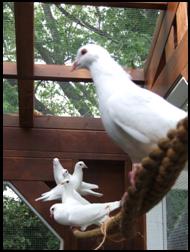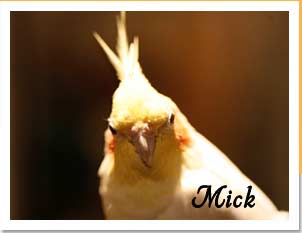Birds Outside
By Elizabeth Young, MickaCoo Pigeon & Dove Rescue
Every issue, I have the privilege of submitting something on behalf of MickaCoo Pigeon & Dove Rescue to be considered for publication in Mickaboo’s newsletter- The Mickaboo Bird Rescue Companion and, while this quarter has been filled with lots of exciting stories, there’s one topic that has really been on my mind lately and that, I think, is very important to all of our birds, pigeons and parrots alike- and that is being outside.

The knowledge that I’ve developed these past couple of years has been pigeon-focused and, even with them, I do not consider myself an expert so this article is not being offered to you as an authoritative piece (as some of our members are capable of offering) but rather as a conversation starter.
I think that it is really valuable for companion birds to spend as much time as they can (safely and properly enclosed and cared for) outside. When potential adopters apply to MickaCoo for pigeons and doves, I’m always most concerned about the health and well being of those that would live indoors. Even with laid back, mellow pigeons that excel at the leisure arts, I believe they are at risk of boredom indoors that they would not be if kept in the proper environment outdoors.
 Pigeons that I foster often start out staying indoors because they are sick or injured and need the rest and warmth that comes from being on a heating pad in a crate but, as they regain their strength, I move them outdoors for longer and longer periods of time (until they’re living outside full time) and I’ve noticed that, while outside, the recuperating birds are more alert, more engaged in their surroundings and more likely to preen. Likewise, I give my hook bills time outside everyday and I notice that they are much more self-sufficient while outside. I think they are more entertained by the outside world than the indoor one.
Pigeons that I foster often start out staying indoors because they are sick or injured and need the rest and warmth that comes from being on a heating pad in a crate but, as they regain their strength, I move them outdoors for longer and longer periods of time (until they’re living outside full time) and I’ve noticed that, while outside, the recuperating birds are more alert, more engaged in their surroundings and more likely to preen. Likewise, I give my hook bills time outside everyday and I notice that they are much more self-sufficient while outside. I think they are more entertained by the outside world than the indoor one.
There are, I believe, a lot of benefits to birds spending time outside: Their lives are enriched with a more stimulating environment, the quality of their lighting is improved, the quality of their air is improved and very often, they can have access to larger cages when outside than when indoors.
Those of us who have attended Mickaboo’s excellent (and free) Avian Lighting Class, have learned how incredibly visual birds are and how critically important proper lighting is for their well being, in many different ways. Indoor lighting suitable for humans is not at all sufficient for their needs and so, while it is very important to provide an “indoor lighting system that simulates the qualities of sunlight”, it only makes sense that direct access to true sunlight would be optimal.
Also, studies consistently rate indoor air pollution as worse than outdoor air pollution and, while I believe fresh air is important for all birds, those who are or who live with the dusty breeds such as cockatiels, cockatoos, African Greys, etc. can especially benefit from the super air filtration system that comes just from being outside.
And I don’t know if this is true in every case but I have heard a trusted avian vet say, “outside birds don’t pluck”.
 People are often surprised to learn that pigeons and doves can live very well outside in the Bay Area, year around, without heat. In fact, they love the rain almost as much as they love the sun. I believe there are many kinds of companion birds that are just as well suited to year-around outdoor time and would encourage you to research the climate tolerances of your birds’ breed.
People are often surprised to learn that pigeons and doves can live very well outside in the Bay Area, year around, without heat. In fact, they love the rain almost as much as they love the sun. I believe there are many kinds of companion birds that are just as well suited to year-around outdoor time and would encourage you to research the climate tolerances of your birds’ breed.
There are lots of benefits for the people of outside birds as well, not the least of which is how much easier everything is to clean up outside. And creating a great outdoor enclosure for your birds would probably be a lot easier than you think, whether it is just an outdoor cage or a true aviary.
If you don’t already have a safe, secure outdoor enclosure for your bird(s), I strongly encourage you to make that your next bird project. There are lots of MickaCoo members who have or are building aviaries and we can be resources to folks, even if you’re creating an outside environment for a hook bill rather than a soft bill such as a pigeon or dove. The basic elements are the same- all aviaries must be predator and rodent-proof, bird safe and appropriate and sheltered from weather extremes. Friend of Mickaboo and MickaCoo, Nyla Copp, offers avian habitat consultation, planning and construction and can be found at www.MyBirdieBuddy.com.
And, as this excerpt from avian vet Dr. Fern Van Sant’s recent article on her website entitled Move It! shows, experts agree:
“A first and vital step towards health is one easily achieved by most owners. A second cage outdoors can provide a horizon-expanding experience for companion parrots. Small birds can be relocated to a safe area on porches or decks where they can be easily observed in their own cages. Even 10–15 minutes outside can offer the benefits of fresh air and some ultraviolet light, and these small fories can provide a small success when owners observe their pets’ enjoyment. In cases where logistics or seasonally inclement weather limit access to the outside, an open window or patio door can offer the same advantages. Relocation to a novel site usually evokes interest and more activity and takes advantage of the instinctive behavior to roost and forage in different locations.
When carefully orchestrated, companion birds can easily and safely be set up safely outside in inexpensive screen tents that provide protection from mosquitoes, wild birds, and other pets. Bonded birds accustomed to being indoors and within line of site of owners will need to be educated about the fun and benefits of the outdoors. Visual barriers often help the very bonded, insecure pet bird learn to enjoy some independence. Back packs made of stainless steel or secure mesh offer a chance for a walk/hike or bike ride in a secure environment. Some birds may tolerate or even learn to enjoy a harness.”
What do YOU think? How can you get your birds outside in the sunshine and fresh air safely? Please submit your comments and questions regarding birds outside to pr@mickaboo.org.

